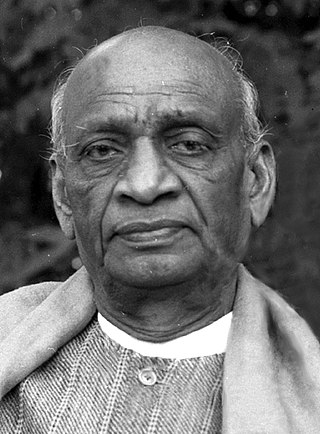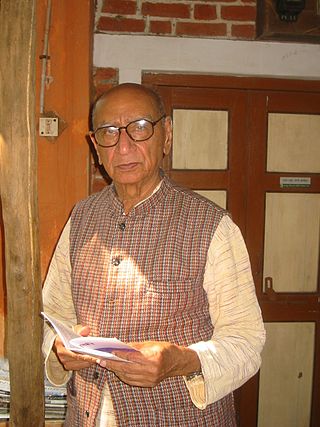Related Research Articles

Vallabhbhai Jhaverbhai Patel, commonly known as Sardar Vallabhbhai Patel, was an Indian independence activist and statesman who served as the first Deputy Prime Minister and Home Minister of India from 1947 to 1950. He was a senior leader of the Indian National Congress, who played a significant role in the Indian independence movement and India's political integration. In India and elsewhere, he was often called Sardar, meaning "Chief" in Hindi, Urdu, Bengali and Persian. He acted as the Home Minister during the political integration of India and the Indo-Pakistani War of 1947.

Mahadev Haribhai Desai was an Indian independence activist, scholar and writer best remembered as Mahatma Gandhi's personal secretary. He has variously been described as "Gandhi's Boswell, a Plato to Gandhi's Socrates, as well as an Ānanda to Gandhi's Buddha".
Mohanlal Pandya was an Indian freedom fighter, social reformer and one of the earliest followers of Mahatma Gandhi. Along with fellow Gandhians like Narhari Parikh and Ravi Shankar Vyas, Pandya was a key organizer of nationalist revolts in Gujarat, and a leading figure in the fight against alcoholism, illiteracy, untouchability, and a major proponent of women's freedoms and Gandhian values.

Ravishankar Vyas, better known as Ravishankar Maharaj, was an Indian independence activist, social worker and Gandhian from Gujarat.

The Bardoli Satyagraha, was a farmers' agitation and nationalist movement in India against the increased taxation of farmers by the colonial government. It demanded a cancellation of the 22% tax hike being levied in Bombay Presidency. The movement began on 12 June 1928. It was eventually led by Sardar Vallabhbhai Patel, and its success gave rise to Patel becoming one of the main leaders of the independence movement.

Gujarat Vidyapith is a deemed university in Ahmedabad, Gujarat, India. This institute was founded in 1920 by Mahatma Gandhi, India's "Father of the Nation" and the leader of the Indian independence movement. It has been deemed university since 1963.

Kochrab Ashram, also known as Satyagraha Ashram, is a historic site and museum in Ahmedabad, Gujarat, India. The ashram was the founded in May 1915 by Mahatma Gandhi, leader of the Indian independence movement. For the next two years he lived in the ashram with several other members of the movement. Some of his Gandhian ideas were conceived during that time. In 1953 the Bombay State named the ashram a memorial and tendered it to the Gujarat Vidyapith a year later. Its renovation and redevelopment into a museum were completed in 2024.

Gujarati Sahitya Parishad is a literary organisation for the promotion of Gujarati literature located in Ahmedabad, Gujarat, India. It was founded by Ranjitram Mehta with the aim of creating literature appealing to all classes of society and cultivating a literary sense among the people. Many prominent people including Mahatma Gandhi and Kanaiyalal Munshi have presided over the organisation. Its headquarters, located on Ashram Road, is known as Govardhan Bhavan. It has a conference hall and library.

Narayan Desai was an Indian Gandhian and author.

Umashankar Jethalal Joshi was an Indian poet, scholar and writer known for his contributions to Gujarati literature. He wrote most of his works in Gujarati.

Dattatreya Balkrishna Kalelkar, popularly known as Kaka Kalelkar, was an Indian independence activist, social reformer, journalist and an eminent follower of the philosophy and methods of Mahatma Gandhi.
Hasubhai Zinzuwadia was an Indian cricketer. He was a right-handed batsman and right-arm offbreak bowler who played for Gujarat. He was born in Ahmedabad.

Maniben Patel was an Indian independence movement activist and a Member of the Indian parliament. She was the daughter of freedom fighter and post-Independence Indian leader Sardar Vallabhbhai Patel. Educated in Bombay, Patel adopted the teachings of Mahatma Gandhi in 1918, and started working regularly at his ashram in Ahmedabad.
Swami Anand was a monk, a Gandhian activist and a Gujarati writer from India. He was the manager of Gandhi's publications such as Navajivan and Young India and inspired Gandhi to write his autobiography, The Story of My Experiments with Truth. He wrote sketches, memoir, biographies, philosophy, travelogues and translated some works.

Ramnarayan Vishwanath Pathak was a Gujarati poet and writer from India. Profoundly influenced by Gandhian thought, Pathak wrote criticism, poetry, drama, metrics and short stories. He edited and translated literary works. He was appointed the president of Gujarati Sahitya Parishad in 1946. He was awarded the Gujarati literary prizes Narmad Suvarna Chandrak for Prachin Gujarati Chhando in 1949 and Sahitya Akademi Award for Bruhat Pingal in 1956.

The Kheda Satyagraha of 1918 was a satyagraha movement in the Kheda district of Gujarat in India organised by Mahatma Gandhi during the period of the British Raj. It was a major revolt in the Indian independence movement. It was the second Satyagraha movement, which was launched 7 days after the Ahmedabad mill strike. After the successful Satyagraha conducted at Champaran in Bihar, Gandhi organised the movement to support peasants who were unable to pay the revenue because of famine and plague epidemic.
Daksha Vijayshankar Pattani was a Gujarati academic and author from India. She was noted as a scholar on Mahatma Gandhi; her 1976 doctoral thesis on Gandhi's philosophy was later published in six volumes.
Kishorlal Ghanshyamlal Mashruwala was an Indian independence activist as well as biographer, essayist and translator. Educated in Bombay and Agra, he completed BA and LLB. He was an associate of Mahatma Gandhi and was deeply influenced by him. He extensively wrote on education, religion and philosophy as well as translated some works in Gujarati.
Chimanlal Narandas Patel was an Indian writer, literary critic and translator from Gujarat, India. He received the Ranjitram Suvarna Chandrak in 2000 for his contribution to Gujarati literature.
Prabhudas Gandhi was an Indian Gujarati language writer and translator. He was a son of Mahatma Gandhi's nephew Chhaganlal Gandhi. He was awarded the Narmad Suvarna Chandrak (1948) for his book Jivannu Parodh..
References
- 1 2 3 4 5 6 7 "નરહરિ પરીખ" [Narhari Parikh]. Gujarati Sahitya Parishad (in Gujarati). Retrieved 28 April 2017.
- 1 2 3 4 5 6 7 8 Brahmabhatt, Prasad (2007). અર્વાચીન ગુજરાતી સાહિત્યનો ઈતિહાસ (ગાંધીયુગ અને અનુગાંધી યુગ)Arvachin Gujarati Sahityano Itihas (Gandhiyug Ane Anugandhi Yug)[History of Modern Gujarati Literature (Gandhi Era & Post-Gandhi Era)] (in Gujarati). Ahmedabad: Parshwa Publication. pp. 63–64.
- 1 2 G.A. Natesan (1957). The Indian Review. Vol. 58. G.A. Natesan & Company. p. 384.
- ↑ Shah, Jumana (26 May 2013). "Where's Mahatma Gandhi's final will?". dna. Retrieved 28 April 2017.
- ↑ "Narhari Parikh's Haveli: Bapu's last link to walled city". The Times of India. 30 January 2012. Retrieved 28 April 2017.
- ↑ "A Gandhi-intoxicated man". The Hindu . 10 April 2005. Retrieved 28 April 2017.[ dead link ]